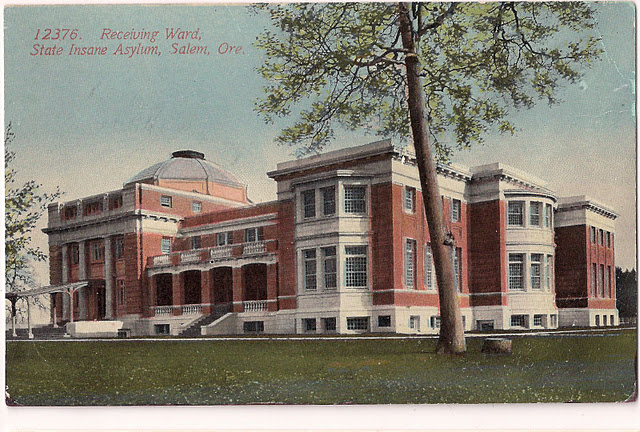From The Eugene Register-Guard, November 10, 2011
Just the thought of more out-of-control psychiatric patients in Lane County without a place to go sent a shudder through mental health care providers on Wednesday.
PeaceHealth is looking for places to reduce expenses, and officials said one potential candidate — among many — is the Johnson Unit, a 36-bed, locked treatment ward at PeaceHealth’s Sacred Heart Medical Center University District.
Karen Gaffney, director of Lane County Health & Human Services, said Wednesday morning that the possibility the unit might close is “very concerning.” Gaffney was speaking at a Lane County Board of Commissioners meeting.
Robin Henderson of the statewide Oregon Psychiatric Inpatient Committee said later in the day if PeaceHealth closed the Johnson Unit, it would destabilize the statewide system of acute inpatient psychiatric care. The Johnson Unit has 12 percent of the 308 adult psychiatric beds in Oregon.
Already, the beds in communities up and down the I-5 corridor fill up regularly, and the hospitals have to ship acutely ill people in secured vans to distant cities, Henderson said. Some days, there are no beds anywhere in the state.
“We deal with it now by basically stacking people in the emergency rooms,” she said. “It happens a half dozen times a year if not more.”
PeaceHealth spokesman Jim Goldbold said there are no plans to close the Johnson Unit, but he couldn’t say there wouldn’t be in the future.
Beginning in September, the Bellevue, Wash., based nonprofit hospital system brought in a pair of consulting firms to review its Oregon operations to look for ways to cut costs and to chart a future under the uncertainties of state and federal health reform.
Huron Consulting Group of Chicago went to work on PeaceHealth’s books, examining fiscal years 2010 and 2011, Godbold said.
The University District was the least profitable hospital in Oregon last year, according to an Oregon Hospital Financial Profile Report. University District’s operating margin, a measure of profitability, was -26.41, the lowest among the state’s 57 hospitals.
The consultants’ findings will undergo a rigorous vetting and will be forwarded for approval of governing boards and executive teams at the regional level and at the system level, Godbold said. System officials in Bellevue should receive the findings in January.
“The consultants have to finish their work,” Godbold said. “There’s no final reports and there’s no discussion of closing the Johnson Unit.”
Jack Roberts, executive director of Lane Metro Partnership, serves on the PeaceHealth regional board. He said there’s strong support for the Johnson Unit among his fellow board members.
“Everybody has got to look at everything,” he said, “but I certainly hope we don’t face that situation. …
“From a humane standpoint and being cynical as an economic development person — you turn all these people loose on the streets and then you say, ‘Come, bring your business to Eugene?’ There’s no way I want that to happen. …
“It would be terrible to lose the Johnson Unit. But, again, we don’t have a money printing machine in the basement, so who knows what’s going to happen?” Roberts said.
PeaceHealth hopes to find partners who can help it bear the cost of providing the acute-care psychiatric beds.
“You’re typically seeing patients who are not able to pay for the care they receive or patients who are in particularly severe personal crisis and don’t have access to the kinds of commercial insurance or programs that would help them,” Godbold said.
The average length of stay at all Oregon hospitals is 4.11 days, according to an industry report. The average length at the University District is 7.06 days, largely because of the Johnson Unit.
But Roberts said there aren’t many deep pockets to help pay for the Johnson Unit. “Certainly, going down the public sector list, it’s really tough. The state is struggling,” he said.
The Johnson Unit treats patients who have conditions that are difficult for other types of public service providers — police officers, counselors — to cope with.
They are people with schizophrenia or bipolar with mania, who are often bought to the hospital by police and are kept involuntarily, said Terry Mastin, assistant executive director at South Lane Mental Health. To qualify for a bed at the Johnson Unit, they have to be evaluated and determined to be a danger to themselves or others. And they really can be, Mastin said.
“They’re psychotic,” she said. “They’re not thinking right, so you don’t know what they’re going to do — and they don’t either. Those are the folks that do really dangerous, crazy things to themselves or the people around them.”
Routinely, the Johnson Unit is full and the mental health staff at the hospital is on the phone, trying to find an empty bed somewhere in the state to place the overflow, Mastin said.
“You’d be sending them, maybe, to Emmanuel Hospital in Portland,” she said. “You’ve already got a stressed system. Once you take a piece out of that the whole system becomes more stressed,” she said.
In 2004, Lane County closed the 12-bed psychiatric hospital that it had paid PeaceHealth to operate at the county jail for 16 years — and where 400 acutely ill mental patients annually were treated and housed.
In 2007, Mercy Medical Center at Roseburg closed its 28-bed inpatient unit, leaving no adult psychiatric beds in Douglas County.
At the time, police officers and librarians there were training to recognize and deal with people in mental health crises, but there was no place to hold them overnight.
“We have a lot of folks from Douglas County coming up in crisis to our (Cottage Grove) ER,” Mastin said, “because there’s nowhere to go.”
